Supplies disruption and impact upon health sector in nepal

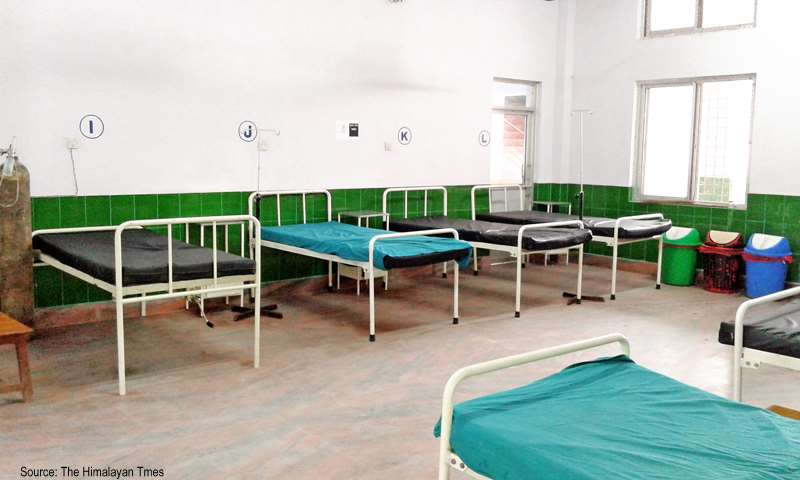

HERD SPECIAL SERIES
FEBRUARY 2016
Supplies Disruption and Impact Upon Health Sector in Nepal A MEDIA MONITORING REPORT Health sector has been severely affected due to the disruption in supplies with irregular supply of surgical equipment and medicines. This has affected timely and comprehensive treatment of the patients. Pregnant, post-partum women, older people, children, earthquake affected communities and patients with obstetric emergencies and chronic conditions have been affected the most. This report documents synthesis of media monitoring of mainstream online news agencies and social media as the findings reflect how critical it is for better preparedness of crisis management for both natural and man-made disasters.
Dr Sushil Baral, Sudeep Uprety and Kritagya Regmi
especially in the rural areas. The regular
immunisation programmes and other
It has not been hidden that Nepal is
campaigns initiated by the government
currently reeling under acute shortage of
to improve the health status of the
all the basic health care services due to
people were also affected badly.
the disruption of supplies at Nepal-India Border since September 24. As the
What this study is about?
supplies have been disrupted, the entire
country has been facing shortage of fuel,
conducted to document and review the
cooking and oxygen gas, gasoline,
impact upon health sector caused by the
medicines and other basic necessities.
disruption of regular supplies coming
Thousands of vehicles carrying goods
have been blocked at the border. Almost
all the economic sectors have been hit
affecting irregularity in distribution of
severely including tourism, industries,
medical supplies and drugs and
transportation as well as agriculture.
functioning of regular health services. HERD
Due to the lack of enough fuel,
Communications team conducted the
transportation had been affected badly.
media monitoring of major online news
The movement of the people hindered as
the number of public vehicles decreased
September to December, 2015. The
study focused in understanding the
transportation of necessary goods. The
problems that the patients are facing,
movement of the public transportation
the availability of health services and the
even outside the valley was affected. The
efforts made by the government to
vehicles were jam-packed, people were
tackle the situation.
been travelling in an unsafe manner risking their lives. The price of the daily
How was the study conducted?
goods therefore increased; schools and
We selected some of the major online
colleges also could not function during
news portals namely Kantipur, Nagarik,
Himalayan Times and The Kathmandu
The health facilities in the country had a
Post for four months focusing on health
tough time treating patients due to the
issues, based on their popularity and
lack of medicines and other essential
audience reach. Random search was also
carried out in the internet with the
Patients were deprived of timely
treatment, some lives were also claimed.
blockade', ‘Nepal India blockade',
The trucks with medicines were stuck at
‘health', ‘blockade health', ‘health sector
the border and the medicines which
were available couldn't be sent due to
‘government health blockade'. We then
the lack of fuel in the necessary places
recorded data in a systematic manner
based on the title of the articles, author,
required for seasonal diseases with the
date published, page it was printed on,
plummeting temperature.
and the health issue it covered. Codes were generated which were then divided
The shortage of medicine in the capital
into broad categories. Microsoft EXCEL
as well as other districts had become
was used to record the data and organize
the codes. Once the articles were
selected, it was categorized into different
injection, laitanopost drop were not
themes. We then synthesized and
available. Similarly, vesoprison injection
interpreted the stories for final
used for neuro surgery and neuro
structuring to produce in the form of a
disorder as well as the medicines
media monitoring report.
required in ICU, CCU and in surgeries were not available.
FINDINGS
Lack of essential supplies
Drugs were also unavailable for treatment of communicable and non-
Numerous health facilities at all levels
communicable diseases and even basic
lacked over half of the
services such as measurement of blood
Lack of access to health
pressure and diabetes in both private
service affected the most vulnerable
and government hospitals. Health
such as pregnant, post-partum women,
facilities were short of drugs for asthma,
older people, children, earthquake
fever, typhoid and cough, among other
affected communities and conditions
seasonal maladies. Medicines to cure mental
including obstetric emergencies and
illnesses, which were imported in large
chronic conditions such as diabetes and
amounts from India, are out of stock.
cardiovascular disease. Medicines and
Health workers in Baitadi and Darchula
other supplies were mobilized in various
districts also said they have run out of
health institutions within the country
and efforts were underway to supply
Hundreds of trucks laden with medicine
more to meet the demand. Medicines
are stranded at various border points.
worth tens of millions of rupees have
Fourteen pharmaceutical industries
along the Birgung-Hetauda section
due to the lack of raw materials and security
threats. Medicine production had come
and far western region were hit hard due
to a halt due to the supplies disruption.
to acute shortage of drugs. Health
Nepal imports medicine and surgical
facilities had to use up the stock due to
equipment worth around Rs 20 billion a
lack of import for a long time.
Pharmacies were short of medicines
The District Public Health Office
clean wounds as well as gastritis
(DPHO) in Kapilvastu was running out
medicines are out of stock.
of stock medicines but had not been able to replenish. Likewise, some districts in
The health facilities have started using
the eastern region were also facing an
acute shortage of medicine due to Tarai
medicines are not being imported from
unrest. Siraha too was facing acute
India. Of the total 70 medicines
shortage of medicine and surgical
provided free by the government only
equipment in the both government and
few medicines are left. There was
private hospitals.
Bajhang was also reeling under the
asthma, eye, allergies, skin, gastrics and
including BCG vaccine,
which immunizes children against tuberculosis. They also lack blood bank.
Pregnant women had also been affected in rural areas as there was shortage of
needed for ICUs, CCUs, general
surgery and other medical services
has been reported in Jhapa as,
Pharmacies lacked injections such as
hospitals were having hard time for
Adrenalin, Atropine, Peperacint and
surgery. People in
as they have a shortage of
Hydrochloride, Pendura, Vasopressin
medicines since the last two months.
and Lobatel Ol. These were used in ICUs/CCUs
Even Ayurvedic hospitals had started
Some pharmacies were short of even
running out of medicines. Tanahun
district was reeling und
Pantoprazole and Omeprazole, which
are used for treating gastroenteritis
treatment of patients had been affected
for want of medicines.
The health facilities in Parasi, Baitadi and Palpa were also having drug crisis.
Public having a hard time
Due to the closure, th
Numerous people suffering from various
diseases had been affected the most due
in villages. The central and
to the disruption of the supplies. Many
regional stores had not been able to
have not been able to visit the hospitals
distribute medicines and the districts
have also not received budget due to
transportation. While some haven't been
which the medicines are not being
able to visit the health facilities as they
distributed. The health facilities were
were unable to afford other means of
having difficulty as the spirits needed to
transportation such as taxis that were charging exceedingly high rates.
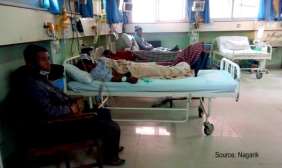
Number of patients visiting hospitals had declined significantly. Even if they reach the health facilities, due to the shortage of medicines. They were referred to other places. The number of patients visiting the health posts has been increasing with the onset
of the winter season but the health posts are running out of medicines. People
The supplies disruption had also posed
living in about 20 VDCs in Mugu were
serious threat to lives of children, elderly
facing difficulties due to the shortage of
and ailing people at the
drugs. Patients who need to undergo
as all the demolished
surgery had been deprived of the service
health facilities were in the same
due to an acute shortage of vaccines in
condition as they were after the
Parsa. The shortage of a vaccine called
devastating earthquake. Several aid
Bupivacaine has deprived pregnant
agencies had committed to rebuild
women of their surgery.
destroyed health facilities including district hospitals and had initiated
National Center for Aids and STD
works in some areas before the
disruption in the supplies started. Due
to the scarcity of raw materials and fuel
in the district, reconstruction works had
across the country were running out of
distribution has been disrupted.
stock, including those in the Tarai region. Over 13,000 people living with
People were unable to utilize free service
HIV, including 2,500 children, had been
getting drugs from the ART centers
other things. Lack of life saving drugs
across the country. Due to the fuel crisis
has created difficulty for patients and
and volatile security situation the
their family. The economically weak
concerned bodies had not been able to
patients and the disabled patients
supply the life-saving drugs to the ART
receiving treatment at the zonal
hospitals have been affected. Lack of medicines for winter diseases have been creating havoc among patients.
Black marketing of essential medicines also led the patients have been forced to pay additional amount. were having a
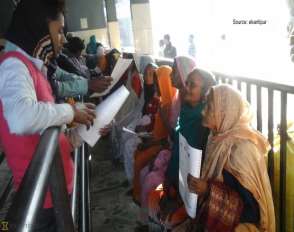
hard time as the dialysis centers have
The leprosy patients going for treatment
shortened their service period. Cancer
at Leprosy Hospital, Lalgadh were
patients were also in a difficult situation
having difficulty as the
as the medicines are difficult to find, the
due to the shortage of oxygen and
other essential medicines. The risk of
radiotherapy not produced in Nepal.
disability and blindness among the
Government hospitals, health posts and
patients due to halt in reconstruction
primary health centers have been
surgery has increased. More than 5
dozen patients were waiting for surgery.
Patients who had been at the hospital awaiting surgery also feared that they
might be affected badly as the surgeries
have been halted. Doctors referred else
medication, and health facilities have
were but the lack of ambulance has
been running out of emergency drugs.
claimed a lot of lives.
Along with the Nepalese the
Hospital finding difficult to
provide services
the treatment cost more in India, a large
Hospitals were having a hard time
number of Indian citizens visit Nepal for
treating patients. The shortage of life
treatment. Indians coming for eye
saving medicines made it difficult to
treatment at Geta Eye Hospital in
provide services. Health institutions
Dhangadi had shown anger due to the
had been compelled to
problems they have been facing. As the
Doctors had been
stock of essential medicines and surgical
equipment are getting short, many
unavailability of necessary medicine.
patients were forced to return without receiving the service.
Due to the humanitarian crisis, the hospitals had been
medicines are not imported the doctors say they have reduced medicines. Even medicines needed for children are not available.
Services adversely affected at Narayani Sub-regional Hospital, Birgunj. Ongoing agitation had also thrown the
Lumbini Zonal Hospital also ra Many concerned bodies urged the government to ease medical
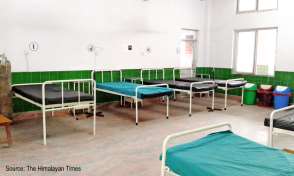
supply. Mechi Zonal Hospital started
in the hospitals throughout the
country including the capital. Even the
due to the lack of blood.
surgeries in big government hospitals were hampered.
Hospital officials in Morang district demanded the government to ease the regular supply of petroleum products to provide health care services to the patients. surgery, ICU and CCU
services, hemodialysis, x-ray, video x-
Hospitals across the country saw sharp
ray, ECG lab and other services. The
drop in the flow of patients given the
hospitals in the districts were also facing
fuel crisis and also essential drugs and
saline stock depleted fast. Likewise, the
mobility of the ambulances has was
Routine Programme hampered
Around 200,000 children have been
Shortage of blood bags had been
reported by many hospitals. It led to
The national Vitamin A programme has
problems in surgery and medication to
been severely hampered.
serious patients. Kidney Transplant
Centre cut its services as due to the
shortage of fuel the doctors. The Red
Child Health Division
Cross Society also could not collect
CHD has been struggling to carry out
enough blood and has not been able to
immunization programmes at health
deploy field workers due to the crisis.
facilities across the country. Regular immunization programmes have been
badly hit in several districts of the
eastern Tarai region.
University Teaching Hospital, Bir Hospital and Shahid Gangalal National
Health workers, serving at the health
Heart Centre, were fast running out of
facilities of the region have said that
their stocks of life-saving drugs,
hundreds of children and pregnant
including adrenaline and atrophin that
women have been deprived of essential
were used for heart patients.
vaccines that protect them from deadly viruses.
District Public Health Office, Banke said they
The ongoing protests and supplies
disruption has hit HIV patients as well.
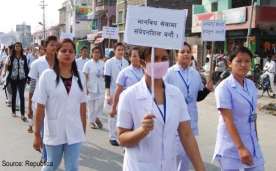
National Center for Aids and STD
Members of civil society also expressed
Control (NCASC) officials said that the
concerns over the disruption in supplies
center is struggling to continue the
resulting in a grave humanitarian crisis
antiretroviral medicines administered to
in Nepal. A group of 12 members of the
the people living with HIV. This
disruption of supplies has also become
including India to recognize
reducing neonatal death and death
the crisis and take effective steps to
related to pneumonia and hypothermia.
bring it to an immediate end.
Concerns
supplies
Ministry of Health and Population
disruption
(MoHP) warned that
The supplies disruption has also gained
the attention of the international bodies.
Hospitals informed MoHP that they are
about the drugs and supply shortage in
not in a position to run hospitals any
more as they essential drugs as well as
organizations have emphasized the
fuel to run ambulances and hospital
seriousness of the present situation and
generators and other drugs to sterilize
its humanitarian implication. They
medical accessories. Hospitals expressed
expressed their commitment to ensure
worries of spreading deadly diseases in
safe access to quality health care
the wards as they lacked drugs to
services. They urged all concerned
sterilized medical accessories.
bodies to ease the supply of essential goods including vaccines and drugs.
As the disruption in supplies started having serious implications on the health
NMA blamed government in its failure
in solving the crisis. NMA highlighted that operations which should not be
The health workers of Biratnagar
postponed are being postponed in the
on November 27 after having
absence of required medicines and
serious problems in treatment of
medicines required for emergency
patients in lack of vital drugs. The health
workers, who are working in various
humanitarian crisis. NMA furthe
hospitals in Biratnagar, and medicine
and the agitating parties
entrepreneurs said that they had to
find a solution to the current crisis
organize the protest programme as they
through dialogue.
were unable to work in an environment
where they lack security of their own
The Ministry of Health and Population
lives. They expressed concerns over the
(MoHP) also informed that it has asked
condition of patients struggling to find
further urged the agitating parties and
in the wake of the acute
the government to keep medical sector
scarcity of essential medicines. MoHP
free from politics.
has also asked all international aid agencies, including Direct Relief, to
Government efforts
provide essential medicines to Nepal.
Government of Nepal has been making
Direct Relief is an international charity
efforts to provide necessary goods to the
people. A task-force formed by the
provided medicines to Nepal in the
The task-force led by Balkrishna
The Ministry of Health and Population
Khakurel, Director General of the
(MoHP) also considered
Department of Drug Administration,
said immediate efforts would be made to
make medicines available to health
Department of Drug Administration
(DDA) has also encouraged the national
In order to tackle the current crisis the
drug manufacturing companies to boost
government planned to use stock of
their production following the supplies
drugs that were meant to be used only
disruption. The DDA has also told those
companies to be prepared to import
The Department of Health
chemicals from Bangladesh and other
Services (DoHS) has decided to use the
countries via air cargo.
medicines that are kept in all five regions of the country as part of the Emergency
CONCLUSION
Assistance. The decision was made after
The earthquake of April 2015 was an
the a majority of hospitals and health
unpleasant experience for all Nepalis.
institutions have ran short of many
The Government of Nepal needs to be
essential and life-saving drugs affecting
acknowledged for its efforts in terms of
the lives of patients.
crisis management during that period. Lessons from the experiences gained
The Ministry of Health and Population
during that period also highlighted the
also got ready for
need for improvement in development
in a bid to ease supply of
drugs in the country. The MoHP is
preparedness plan in order to handle
planning to procure 105 types of
emergency situation of many sectors
essential drugs worth Rs 200 million for
including health. With the greater
initiation of the Ministry of Health and

Population, along with support from private sector, various development partners, NGOs, local communities, foreign medical teams and several voluntary associations and groups; the emergency situation was managed to some extent. Now, with crisis of the earthquake aggravated with another man-made disaster through supplies disruption, it has become more important than ever to develop a comprehensive
management response plan for such crisis situations so as to be more prepared in the future. With the comprehensive response plan in place; a greater preparedness is required with regards to adequate skilled human resources, infrastructure, data management information
Preparedness Unit in health with well-equipped
resource and logistics is the need of the hour. This unit needs to be operational not only at the central level but also in regional level, and in strategic locations so that the response initiatives can be immediately as the situation demands.
Corresponding Author:
Health Research and Social Development Forum (HERD) Thapathali, Kathmandu, Nepal URLEma
Source: http://www.herd.org.np/sites/default/files/resources/Media%20Monitoring%20of%20Supplies%20Disruption-Special%20Series%20Report.pdf
Long chain polyunsaturated fatty acids are requiredfor efficient neurotransmission in C. elegans Giovanni M. Lesa1,*,‡, Mark Palfreyman2, David H. Hall3, M. Thomas Clandinin4, Claudia Rudolph5,Erik M. Jorgensen2 and Giampietro Schiavo11Molecular Neuropathobiology Laboratory, Cancer Research UK, London Research Institute, Lincoln's Inn Fields Laboratories, 44 Lincoln's InnFields, London WC2A 3PX, UK2Department of Biology, University of Utah, Salt Lake City, Utah 84112-0840, USA3Center for C. elegans Anatomy, Department of Neuroscience, Albert Einstein College of Medicine, Bronx, New York 10461, USA4Nutrition and Metabolism Research Group, University of Alberta, Edmonton, Alberta, T6G 2P5, Canada5EleGene AG, Am Klopferspitz 19, 82152 Martinsried, Germany*Present address: MRC Laboratory for Molecular Cell Biology, University College London, Gower Street, London WC1E 6BT, UK‡Author for correspondence: (e-mail: [email protected])
Neurobiobank München Koordinierendes Mitglied des Brain-Net Deutschland und d es BrainNet Europe Zentrum für Neuropathologie und Prionforschung Leitu ng: Feodor-Lynen-Str. 23 Prof. Dr. med. Armin Giese Zentrum für Neuropathologie und Prionforschung Tel.: 089 / 2180-78345 Prof. Dr. med. Peter Falkai








